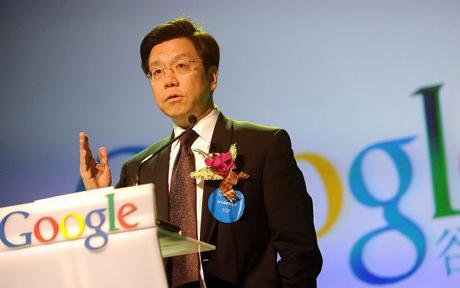 |
| Some business analysts accuse Google of bending too far in response to Chinese government threats Photo: Getty |
That was in 2006. Yesterday the sudden and unexpected resignation of Kai-Fu Lee, the head of Google China, reignited the debate about how a business model built on providing unfettered access to information can possibly thrive in a regime that thrives on control - and whether it should try to.
Mr Lee, 47, who was born in Taiwan but educated in the US, is seen in China as an Alan Sugar-type business celebrity - and after four years at the helm was said yesterday to be leaving to start a venture capital fund to help young Chinese entrepreneurs start new web-based businesses.
But his surprise departure from a high-flying role in one of the world's most influential companies has led inevitably to new questions about the tensions between Google and China's communist leadership.
It follows 12 months in which Google China, despite its decision to accept restrictions on its search engine to conform with communist censorship, has come under increasingly hostile fire from the Beijing government.
The company denied that Mr Lee's departure was a sign of anything other than his desire to embark on something new. But on his blog he wrote that he wanted to be "actively involved in the work and to have full control over it" - a hint, some suspect, that he did not feel completely in charge of events.
Mathew McDougall, the chief executive of SinoTech Group, China's largest independent digital marketing agency, told The Sunday Telegraph: "He seems like a guy who tried very hard and in the end got frustrated in the role.
"Since he arrived at Google he's had a difficult job - and myriad bad publicity in the last quarter. None of that has made his life easier and it looks as if he's gone off to do something for himself that is free of the constraints that come with trying to do business in the Chinese internet market."
In January, three years after Google China (Google.cn) was launched, Beijing authorities fired a warning shot.
As part of an initiative "to purify the internet's cultural environment" the government accused the search engine of failing to use effective measures to block searches for "vulgar, pornographic sites".
In June, state censors went further, announcing "punitive measures" over the same concern, and blocking all access to the site for several hours. A spokesman for the Chinese foreign ministry accused the search engine of spreading "large amounts of vulgar content that is lascivious and pornographic, seriously violating China's relevant laws and regulations".
Google, which had been careful to heavily self-censor during the 20th anniversary of the Tiananmen Square massacre a few weeks earlier, swallowed the ticking off.
Having recently had access to its You Tube site barred by censors, it altered its search algorithms in an attempt to meet the government request.
However, suggestions of unfair bias against the company began to circulate when it became clear that similar pornography was equally available through Chinese web portals which were not receiving the same treatment. read more>>
***
Related Links
China Internet filtering software:Green Dam-Youth Escort
Green Dam Developer Tied to Henan's Most Corrupt Official
Is Censorship of the Internet Necessary in China?
Warning:The use of any news and articles published on eChinacities.com without written permission from eChinacities.com constitutes copyright infringement, and legal action can be taken.
All comments are subject to moderation by eChinacities.com staff. Because we wish to encourage healthy and productive dialogue we ask that all comments remain polite, free of profanity or name calling, and relevant to the original post and subsequent discussion. Comments will not be deleted because of the viewpoints they express, only if the mode of expression itself is inappropriate.
Please login to add a comment. Click here to login immediately.